Why do a Van Morrison cover song when you can create a lesbian fever dream?
“Jesus died for somebody’s sins, but not mine.”
These are the first words uttered by Patti Smith on her debut album in 1975, and holy damnation, what a first impression. This snarling declaration, made by a woman in rock n roll, was holy water to listeners betrayed by conventionality. If anyone asks where punk rock was birthed, it was this not-so-immaculate conception between Patti Smith and the song’s muse, Gloria. Some argue the finer points about who exactly gets credit for starting the punk rock genre. Smith herself would deny the title, “Godmother of Punk,” but her brutally honest lyrics, androgynous style, and raw performances inspired scores of punk bands, including The Slits, the all-woman group that formed the day after Ari Up saw Smith perform live in 1976.
The song continues,
“Meltin' in a pot of thieves
Wild card up my sleeve
Thick heart of stone
My sins my own
They belong to me”
Technically, Smith’s version of “Gloria” is a cover. It was originally written by Van Morrison in 1964 for his garage rock (the genre that inspired punk) band, Them. It’s been covered by the biggest names in rock n roll including The Doors, The Grateful Dead, David Bowie, and Jimi Hendrix. But it’s almost insulting to place Patti Smith’s version of “Gloria” in the same category as anyone who tried it before her. Her version is beyond a mere cover. Although the chorus is the same and some of the emotion carries over from the original, make no mistake, these are entirely different experiences. Most lyrics are rewritten, including the iconic opening line. She switches the gender and sings from a woman’s perspective. These touches are what make the song so punk rock… it’s overtly gay, and so clearly setting a boundary with religion. Save the patriarchal martyr stories. Patti has other priorities — and one of them is having sex with a woman named Gloria.
Smith was a poet long before she was a punk rock icon. Smith originally wrote a poem in 1970 called “Oath” that began, “Christ died for somebody’s sins but not mine.” It was a defiant rejection of the shame and guilt inflicted by religion. Five years later, fragments from that poem wove their way into a classic tune and took on a life of their own.
To illustrate how different Smith’s lyrics and story are from the Van Morrison original, here is Morrison describing having a pretty decent time with our muse:
“She knock upon my door
And then she comes to my room
And she make me feel alright.”
How sweet, maybe even memorable.
When Smith takes hold of the song, though, she throws herself at the altar of Gloria’s body and the lyrics become a lesbian fever dream.
And my baby is walkin' through the door
Leanin' on my couch she whispers to me and I take the big plunge
And oh, she was so good and oh, she was so fine
And I'm gonna tell the world that I just (ah-ah) made her mine
She first meets Gloria at some lame party that she wants to leave, until — she sees “a sweet young thing, humping on the parking meter.” (Definitely not Morrison’s lyrics.) The pace of the song quickens; so does your heartbeat. Her voice gets louder, more primal.
There were twenty thousand girls
Called their names out to me
“Marie” and “Ruth” but to tell you the truth
I didn't hear them
I didn't see
I let my eyes rise to the big tower clock
And I heard those bells chimin' in my heart
Going DING DONG DING DONG DING DONG DING DONG
Counting the time, until you came to my room
And you whispered to me and we took the big plunge
And oh. You were so good, oh, you were so fine
And I gotta tell the world that I MAKE HER MINE MAKE HER MINE MAKE HER MINE MAKE HER MINE
G-L-O-R-I-A
Listening to Smith describe her escapade with this goddess would make anyone want to experience it. Your own sexuality is cast aside for 5 minutes and 55 seconds. You are going to take a big plunge into Gloria, and you are going to love it.
Smith didn’t purposefully intend “Gloria” as a lesbian anthem. Patti Smith isn’t a lesbian. She often wrote songs beyond the gender binary. In a 2005 interview with The Guardian, she says: “I always enjoyed doing transgender songs. That's something I learnt from Joan Baez, who often sang songs that had a male point of view.”
“My work does not reflect my sexual preferences, it reflects the fact that I feel total freedom as an artist. On Horses, that's why the sleeve note has that statement about being ’beyond gender.’ By that, I meant that as an artist, I can take any position, any voice, that I want.”
With one song about fucking a woman and the patriarchy, Smith ascended as an icon for queer and disenfranchised listeners and molded the template for future punk and riot-grrrl bands and for androgynous fashion. Hers is the face that launched a million Shanes from the L Word.
“I wanted Horses to say ‘if you feel like you don't belong anywhere, hopefully this will inspire you or give you some respite.” In excelsis deo Patti. Thank you.
Everybody Play The Game
It’s so easy when know the rules. It’s so easy, all you have to do is…
Name the former member of the Velvet Underground who produced Patti's first album, Horses?
a) Lou Reed
b) Sterling Morrison
c) John Cale
d) Mo Tucker
(Scroll to the bottom for the answer.)
Every week, we’ll spotlight one story from a reader about the song or music video that made them first have THOSE feelings. We all remember the moment that a song sparked a tingling sensation in our swimsuit area.
This week’s submission: “Sex and Candy” - Marcy Playground
Submission: Ken
I came from a sheltered background so just hearing the word "sex" aloud was exciting. Combine that with learning that sex had a smell... and confusion trying to figure out what platform double-suede had to do with sex (turns out it was just nonsensical references to disco)
And you’re a material girl.
Welcome to our merch store! Every week, we’ll offer some cool swag based on the artist from each issue.
*Full disclosure: I do make money on the sales of these items. Your purchases help me pay to keep this publication running. 10% of all proceeds also go to the Dream Defenders, a non-profit organization dedicated to fighting the erasure of Black and queer rights in the state of Florida.
Just Kids, Smith’s autobiographical depiction of her close relationship with famed queer photographer Robert Mapplethorpe (who also shot the album art for Horses), is one of the most inspiring books I’ve ever read. Here is the summary:
Just Kids begins as a love story and ends as an elegy. It serves as a salute to New York City during the late sixties and seventies and to its rich and poor, its hustlers and hellions. A true fable, it is a portrait of two young artists’ ascent, a prelude to fame. It was a time of heightened awareness, when the worlds of poetry, rock and roll, art, and sexual politics were colliding and exploding. In this milieu, two kids made a pact to take care of each other. Scrappy, romantic, committed to create, and fueled by their mutual dreams and drives,they would prod and provide for one another during the hungry years.
QUIZ ANSWER: It’s C - John Cale. He is also featured on bass and vocals on Smith’s cover of The Who’s “My Generation,” which was released as the B-side to “Gloria.”
Did you catch last week’s issue?






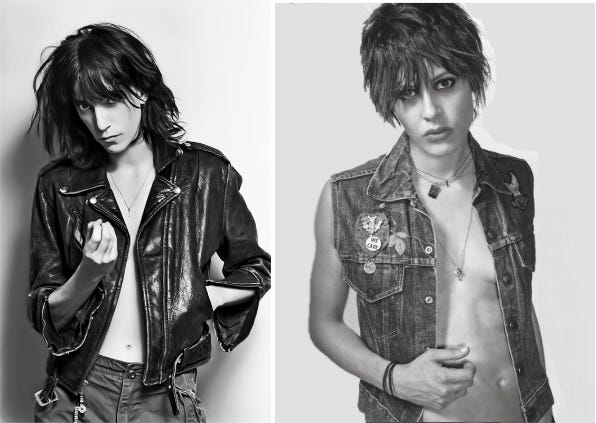
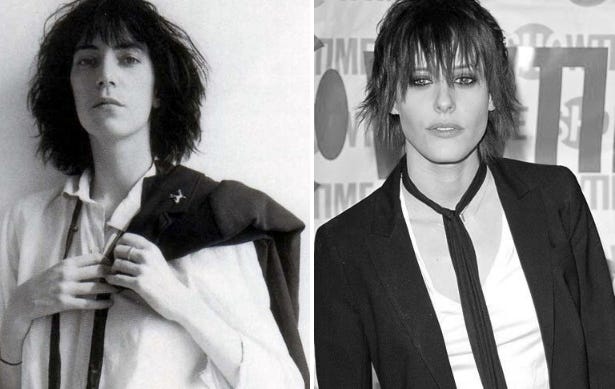

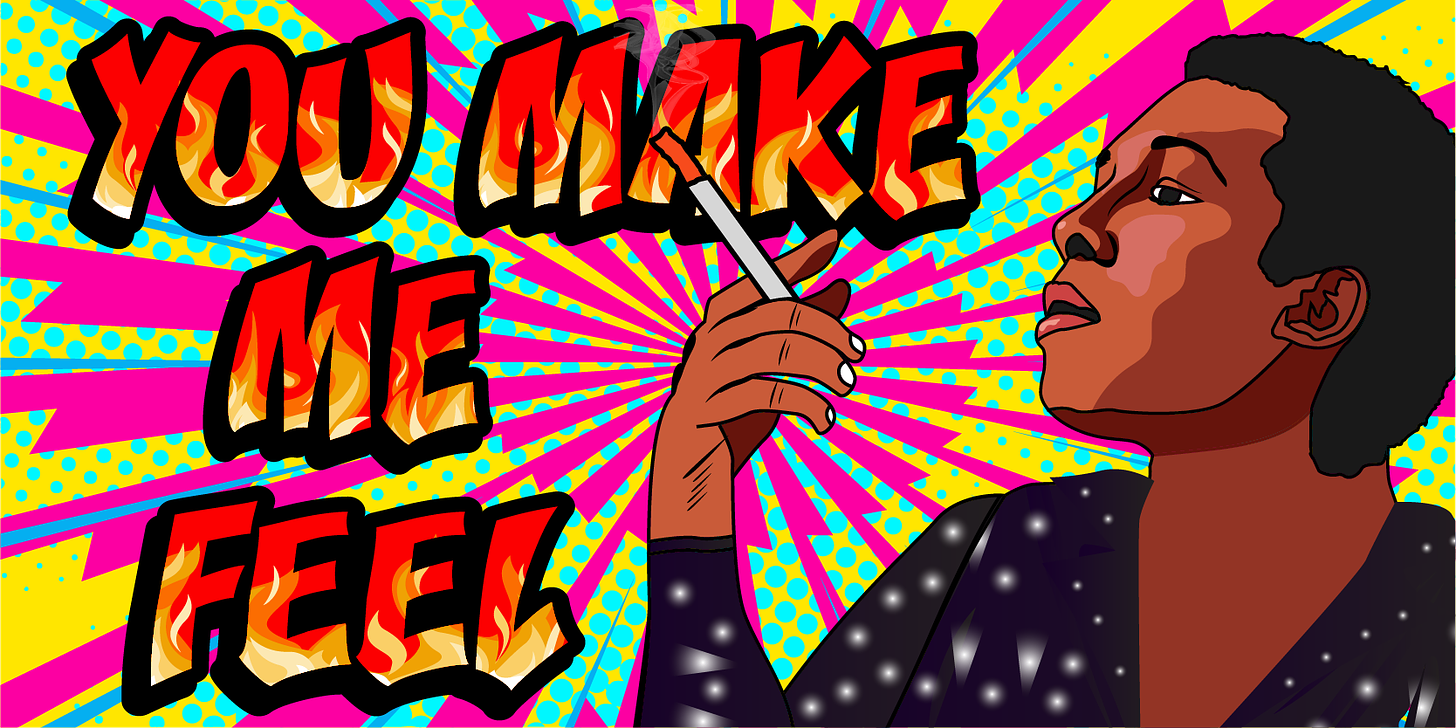

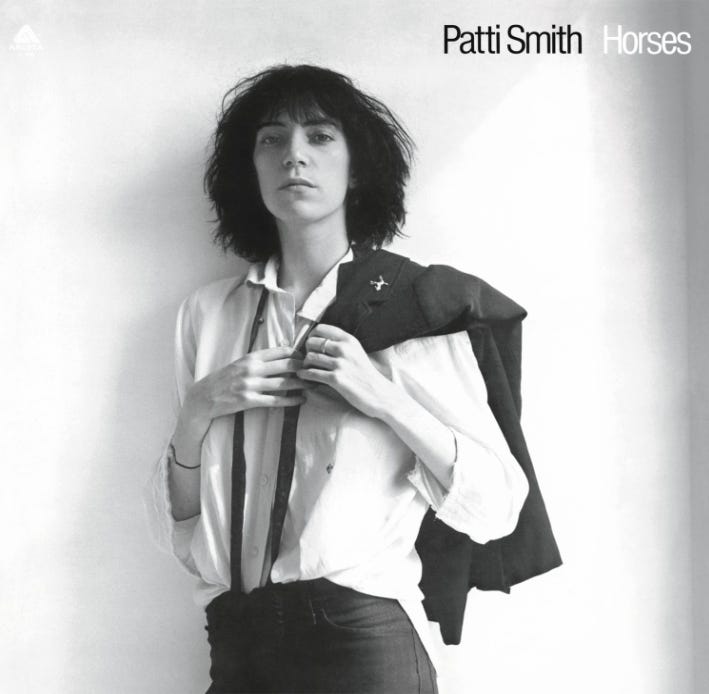
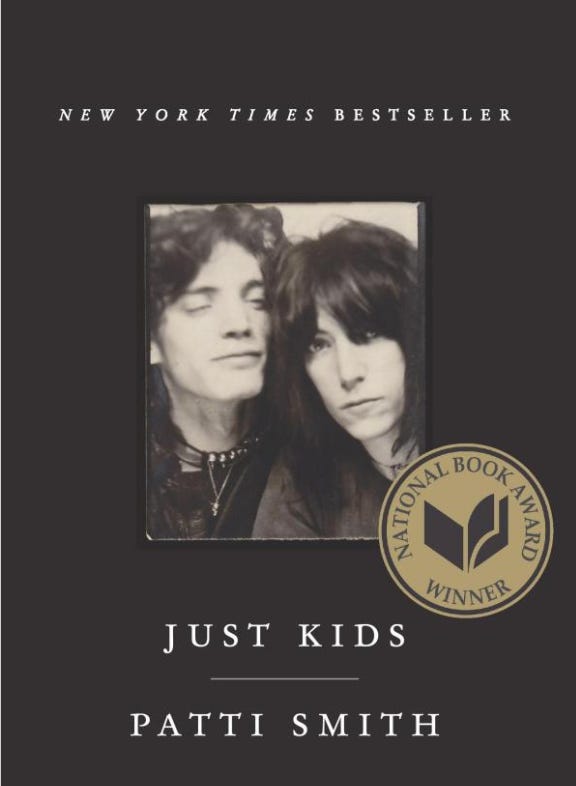

💜💜💜
still rocked, but not surprised, by the jewels you’ve been carving and polishing on the other side of too far. as you know, i came late to the Patti Smith party (and so many others). thank Gloria, I’ve arrived.
🔥🎸⭕️🎯💃🏻
My first interview as a rock critic was with Patti, the night before Horses was released. All I'd heard when we spoke, between sets at San Francisco's Boarding House, was the single I treasured, Hey Joe/Piss Factory. That was intense, but it didn't prepare me for her (their) performance, which began with a reworking of the Velvet Underground's "We're Gonna have a Real Good Time Together," and got wilder from there. I missed seeing Elvis on Ed Sullivan (though I. Did see Three Beatles), but Patti had the same sorry of impact on a young kid who fit in, but didn't quite. Earth shattering. Thanks for bringing it all back.